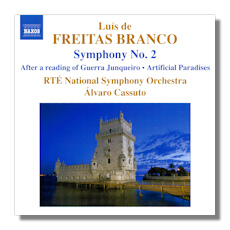
The Internet's Premier Classical Music Source
Related Links
- Freitas Branco Reviews
- Latest Reviews
- More Reviews
-
By Composer
-
Collections
DVD & Blu-ray
Books
Concert Reviews
Articles/Interviews
Software
Audio
Search Amazon
Recommended Links
Site News
 CD Review
CD Review
Luís de Freitas Branco

Orchestral Works, Volume 2
- Symphony #2
- After a reading of Guerra Junquiero
- Artificial Paradises
RTÉ National Symphony Orchestra/Álvaro Cassuto
Naxos 8.572059 DDD 67:49
This, the second release in Naxos' series devoted to the orchestral works of Freitas Branco (1890-1955), is one terrific CD. It might sound overly simplistic to say so, but Spanish composers often write music that sounds Spanish. On the other hand, there's little about the music of Portuguese composer Luís de Freitas Branco that suggests the Iberian peninsula. (The same is true for Joly Braga Santos, a pupil of Freitas Branco, and a distinguished and even more interesting composer in his own right.) The music on this CD is European, but not identifiably Iberian.
Only two years separate Freitas Branco's first two symphonies (1924 and 1926, respectively), but it seems that the composer grew by leaps and bounds during that period. The Franckian First Symphony (Naxos 8.570765) is thematically distinguished, although the development sometimes feels workmanlike. The Second Symphony, on the other hand, is consistently inspired. The influence of Franck can be heard here as well, not least in Freitas Branco's use of a Gregorian chant as thematic material throughout. The slow movement contains what might be an echo of Bruckner's Third Symphony, and the scherzo-like third movement, with its subtly diabolical mood, also suggests Bruckner. The finale is an emotionally and musically satisfying summation of what has come before, and ends with a triumphant presentation of the Gregorian theme first heard 40 minutes earlier.
Guerra Junquiero was Portuguese author. His poem The Death of Don Juan was one of the inspirations behind the second orchestral work included on this CD. The other inspiration was composer Richard Strauss, who conducted his own Don Juan and Till Eulenspiegel in Lisbon in 1908. The teenaged Freitas Branco was in the audience, and must have been powerfully impressed by what he heard, because After a reading of Guerra Junquiero (1909) contains near-quotations from both of those tone poems. In other words, to call this work "Straussian" would be an understatement!
There is a literary inspiration behind Artificial Paradises as well, and that is Thomas De Quincey's memoir Confessions of an English Opium Eater. This is another youthful work (1910), but a very assured one. Over the course of 14 minutes, Freitas Branco creates an atmosphere that is both luscious and sickly, somewhat like Debussy's Le martyre de Saint Sebastien. Indeed, it is not Franck who is suggested here, but the French impressionists. The tempo is slow throughout, and interest comes from the languorous melodies and from the ever-varied orchestral textures. Hallucinogens are dangerous and illegal, and Freitas Branco's Artificial Paradises arguably gives us a chance to enjoy them with no unwanted consequences!
The Second Symphony was recorded just a couple of years ago by the Extremadura Symphony Orchestra conducted by Jesús Amigo (Atma Classique ACD2-2578). This new recording surpasses it handily. When it comes to Braga Santos and Freitas Branco, Cassuto now is the conductor of choice, thanks to a handful of recordings on the Marco Polo and Naxos labels. The Irish orchestra is very capable, although one would like to hear music like this played by an orchestra with a richer sound. The conductor's booklet notes display the insight of an insider.
Copyright © 2009, Raymond Tuttle




















